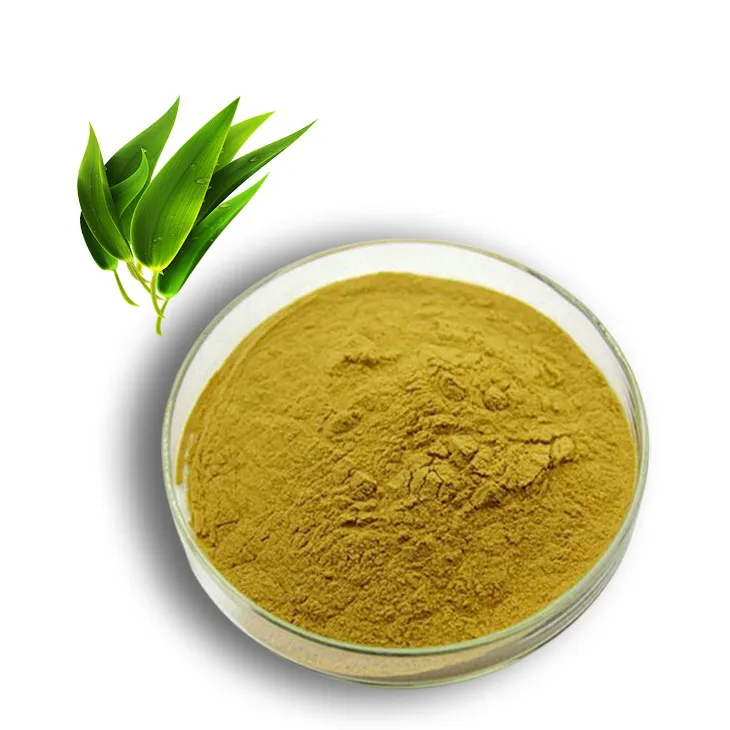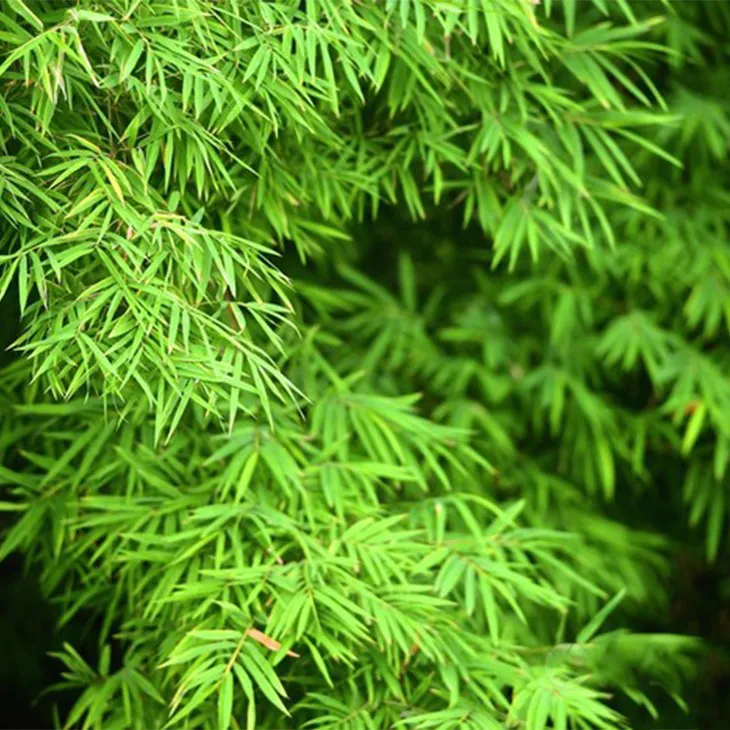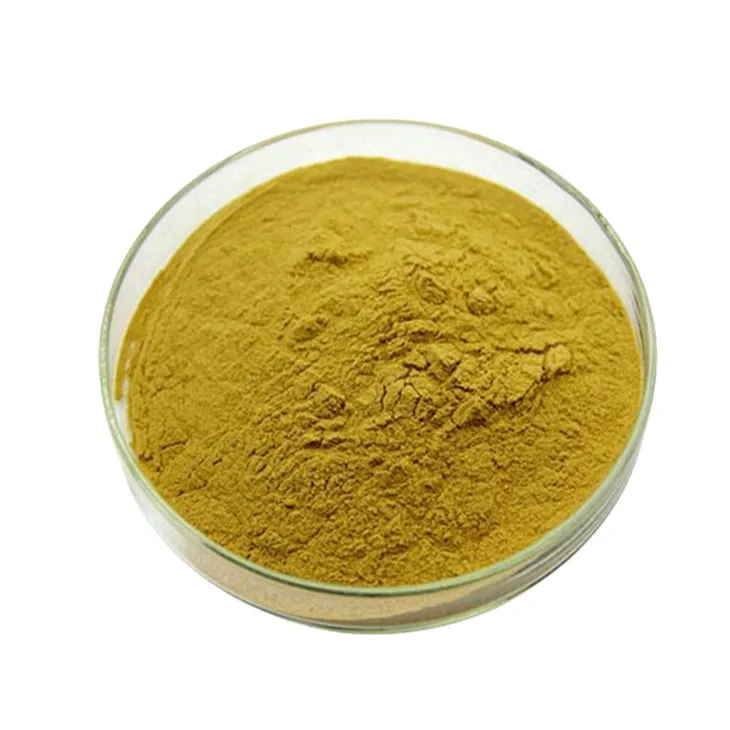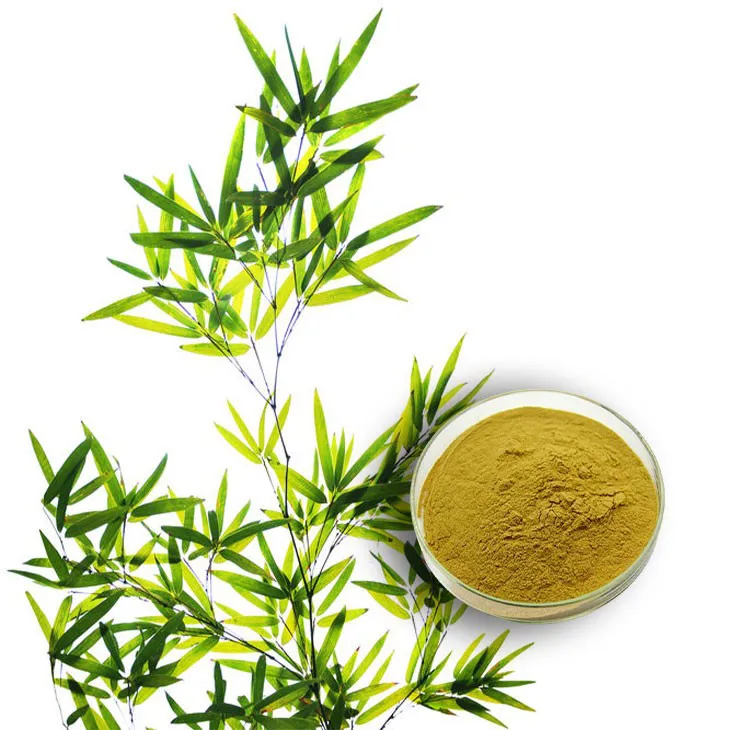- 0086-571-85302990
- sales@greenskybio.com
Best Answers to 7 Key Questions about Bamboo Leaf Extract.
2024-12-20

1. What is Bamboo Leaf extract?
Bamboo Leaf extract is a substance derived from bamboo leaves. It is obtained through various extraction methods. Bamboo, which is known for its rapid growth and wide distribution in many parts of the world, has leaves that contain a rich array of bioactive compounds. These compounds are what make the Bamboo Leaf extract so interesting in terms of its potential applications.

2. What are the Main Components of Bamboo Leaf Extract?
Flavonoids are among the main components of bamboo leaf extract. Flavonoids are a large class of plant - derived compounds with antioxidant properties. In bamboo leaf extract, flavonoids such as orientin and isoorientin are present. These flavonoids play important roles in protecting cells from oxidative stress.
Phenolic acids are also found in bamboo leaf extract. These compounds contribute to the antioxidant activity of the extract as well. For example, caffeic acid and chlorogenic acid are phenolic acids that can be detected in bamboo leaf extract.
Additionally, bamboo leaf extract contains some amino acids. Amino acids are the building blocks of proteins and are essential for various biological functions. The presence of amino acids in bamboo leaf extract may also contribute to its potential health benefits.

3. What are the Health Benefits of Bamboo Leaf Extract?
Antioxidant Activity
- The flavonoids and phenolic acids in bamboo leaf extract act as antioxidants. They can scavenge free radicals in the body, which are unstable molecules that can cause damage to cells, DNA, and proteins. By reducing oxidative stress, bamboo leaf extract may help prevent various diseases associated with oxidative damage, such as cardiovascular diseases, cancer, and neurodegenerative disorders.
Anti - inflammatory Effects
- Some studies suggest that bamboo leaf extract may have anti - inflammatory properties. Inflammation is a natural response of the body to injury or infection, but chronic inflammation can lead to various health problems. Bamboo leaf extract may help regulate the inflammatory response, potentially reducing the risk of inflammatory - related diseases.
Blood Sugar Regulation
- There is evidence to indicate that bamboo leaf extract may play a role in blood sugar regulation. It may help improve insulin sensitivity, which is important for maintaining normal blood sugar levels. This could be beneficial for individuals with diabetes or those at risk of developing diabetes.

4. How is Bamboo Leaf Extract Produced?
Harvesting
- First, the bamboo leaves are harvested. The timing of the harvest is crucial as it can affect the quality and composition of the extract. Bamboo leaves are usually harvested when they are mature but still fresh.
Cleaning and Drying
- After harvesting, the leaves are carefully cleaned to remove any dirt, debris, or impurities. Then, they are dried. Drying can be done using natural methods such as sun - drying or through the use of drying equipment to ensure proper moisture removal.
Extraction
- There are different extraction methods for bamboo leaf extract. One common method is solvent extraction, where solvents such as ethanol or water are used to extract the bioactive compounds from the dried bamboo leaves. Another method is supercritical fluid extraction, which uses supercritical fluids like carbon dioxide under specific conditions to obtain the extract.
Purification and Concentration
- Once the extract is obtained, it may need to be purified to remove any unwanted substances. This can be done through filtration or other purification techniques. After purification, the extract may be concentrated to increase the concentration of the bioactive compounds for better efficacy.

5. What are the Applications of Bamboo Leaf Extract in the Cosmetic Industry?
Antioxidant in Skincare
- In skincare products, bamboo leaf extract can be used as an antioxidant. It helps protect the skin from environmental damage such as UV radiation and pollution. By reducing oxidative stress on the skin, it can contribute to maintaining healthy, youthful - looking skin.
Anti - inflammatory for Skin Conditions
- For skin conditions associated with inflammation, such as acne or eczema, bamboo leaf extract may be beneficial. Its anti - inflammatory properties can help soothe irritated skin and reduce redness and swelling.
Moisturizing and Nourishing
- Bamboo leaf extract contains components that can help moisturize and nourish the skin. It can improve the skin's hydration levels and leave the skin feeling soft and smooth.
6. What are the Applications of Bamboo Leaf Extract in the Food Industry?
Natural Preservative
- Due to its antioxidant properties, bamboo leaf extract can be used as a natural preservative in the food industry. It can help prevent the oxidation of fats and oils in food products, thereby extending their shelf life.
Functional Ingredient
- Bamboo leaf extract can also be added to food products as a functional ingredient. For example, in beverages, it can be added to provide antioxidant benefits. In some traditional foods, it can be incorporated to enhance the nutritional value.
7. Are There Any Side Effects or Precautions Associated with Bamboo Leaf Extract?
Allergic Reactions
- Some individuals may be allergic to bamboo leaf extract. Allergic reactions can range from mild skin rashes to more severe symptoms such as difficulty breathing in extreme cases. People with known allergies to plants should be cautious when using products containing bamboo leaf extract.
Drug Interactions
- There is a possibility of drug interactions. If you are taking medications, especially those related to blood sugar regulation or blood thinning, it is advisable to consult a healthcare provider before using bamboo leaf extract. This is to ensure that there are no adverse effects on the effectiveness of the medications or on your health.
FAQ:
What are the main components in bamboo leaf extract?
Bamboo leaf extract contains various components. It is rich in flavonoids, which are known for their antioxidant properties. There are also phenolic acids and polysaccharides. Flavonoids like orientin and isoorientin are among the important bioactive compounds present in bamboo leaf extract.
What are the health benefits of bamboo leaf extract?
Bamboo leaf extract has several potential health benefits. Its antioxidant properties can help combat oxidative stress in the body, which is associated with various diseases. It may also have anti - inflammatory effects, potentially reducing inflammation in the body. Additionally, some studies suggest that it could have a positive impact on cardiovascular health by helping to regulate blood pressure and cholesterol levels.
How is bamboo leaf extract produced?
The production of bamboo leaf extract typically involves several steps. First, fresh bamboo leaves are collected. Then, they are washed thoroughly to remove any impurities. After that, the leaves are usually dried. The dried leaves are then subjected to extraction methods, which can include solvent extraction. For example, ethanol or water - ethanol mixtures can be used as solvents to extract the bioactive compounds from the bamboo leaves. Finally, the extract is purified and concentrated to obtain the final bamboo leaf extract product.
Is bamboo leaf extract safe for consumption?
In general, when used appropriately, bamboo leaf extract is considered safe for consumption. However, like any supplement, it should be used in moderation. Some people may be allergic to certain components in the extract, so it is important to be cautious, especially for those with a history of allergies. Also, it is advisable to consult a healthcare professional before starting to use bamboo leaf extract, especially if you are taking other medications or have underlying health conditions.
What are the applications of bamboo leaf extract in the food industry?
Bamboo leaf extract has various applications in the food industry. It can be used as a natural antioxidant to extend the shelf life of food products. For example, it can be added to oils, fats, and processed foods to prevent rancidity. It can also be used as a flavoring agent, adding a unique and natural flavor to food and beverages. Some products like certain teas or functional drinks may contain bamboo leaf extract for its health - promoting properties as well as flavor.
Related literature
- Analysis of Bioactive Compounds in Bamboo Leaf Extract"
- "The Health - Promoting Effects of Bamboo Leaf Extract: A Review"
- "Production and Quality Control of Bamboo Leaf Extract for Food and Pharmaceutical Applications"
- ▶ Hesperidin
- ▶ Citrus Bioflavonoids
- ▶ Plant Extract
- ▶ lycopene
- ▶ Diosmin
- ▶ Grape seed extract
- ▶ Sea buckthorn Juice Powder
- ▶ Fruit Juice Powder
- ▶ Hops Extract
- ▶ Artichoke Extract
- ▶ Mushroom extract
- ▶ Astaxanthin
- ▶ Green Tea Extract
- ▶ Curcumin
- ▶ Horse Chestnut Extract
- ▶ Other Product
- ▶ Boswellia Serrata Extract
- ▶ Resveratrol
- ▶ Marigold Extract
- ▶ Grape Leaf Extract
- ▶ New Product
- ▶ Aminolevulinic acid
- ▶ Cranberry Extract
- ▶ Red Yeast Rice
- ▶ Red Wine Extract
-
Kupilu Extract
2024-12-20
-
Elderberry Extract
2024-12-20
-
Bayberry Extract
2024-12-20
-
Tongkat Ali Extract Powder
2024-12-20
-
Yellow Pine Extract
2024-12-20
-
Panax Ginseng Leaf Extract
2024-12-20
-
Yohimbine Bark Extract
2024-12-20
-
Medicinal Marshmallow Extract
2024-12-20
-
Eyebright Extract
2024-12-20
-
Withania Somnifera Extract
2024-12-20





















